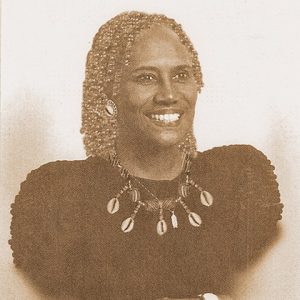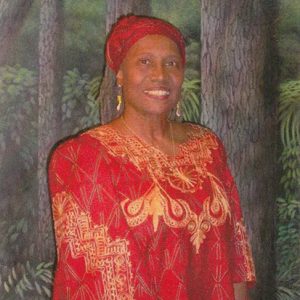calsfoundation@cals.org
Patricia Washington McGraw (1935–2025)
Patricia Washington McGraw, a scholar, professor, and author, made a significant impact throughout the country and the world as an educator and African American cultural preservationist.
Patricia Washington was born in Little Rock (Pulaski County) to William and Ruth Washington, natives of Danville (Yell County), on May 6, 1935. While she was growing up in a time of school segregation and Jim Crow laws, her parents instilled in her the value of education and the importance of embracing her African American heritage. In 1953, she graduated from all-Black Dunbar High School in Little Rock.
McGraw graduated from San Francisco State College in California in 1957 and earned a master’s degree in American literature from the college in 1967. She was the first Black member of the Phi Beta Kappa honors society there. She taught at Philander Smith College in Little Rock in the late 1960s and was the first Black faculty member at the University of Arkansas Little Rock.
She married Tyrone Power McGraw (1943–2015), who was a professor and coach at Philander Smith College; together, they raised three children.
In 1982, she received a PhD in sociolinguistics and Black studies from Washington University in St. Louis, Missouri. McGraw joined the faculty of the University of Central Arkansas (UCA) in Conway (Faulkner County) in 1987, where she served as a professor of English and African/African American Studies.
From 1983 to 1994, she owned and operated the McGraw Learning Institute: Abilities Unlimited in Little Rock. The private school, which was state certified to teach through sixth grade, emphasized the importance of African and African American history.
McGraw traveled throughout Africa numerous times performing humanitarian work and educational training. In 1999, on Lake Kivu, between the East African countries of Rwanda and the Democratic Republic of the Congo, members of the Rwandese Parliament presented an island to her due to her ongoing humanitarian work in the country; she was also granted the name mPata (meaning “one of noble birth”). McGraw served as Queen Mother of Imani Temple, her spiritual affiliation.
McGraw retired from UCA in 2000 and remained active in her community and abroad. McGraw published several books, including the novel Hush! Hush! Somebody’s Calling My Name (2000), and more than 500 articles and poems. She also received more than 300 teaching excellence and community service awards on the local, state, and national levels. In 2004, she was inducted into the Arkansas Black Hall of Fame. She was a longtime member of National Association of Black Storytellers, a founding member of the Afro-American Genealogical and Historical Society in Arkansas, and a member of the Rufus K. Young Christian Church. She co-hosted television shows and created a one-woman show, A Profile of Four Black Women: Look Upon Them and Be Renewed, which was performed more than 400 times in Africa, the West Indies, and Canada.
For years, she continued to pass on the legacy of cultural pride and academic excellence at the Washington Heritage House, the former residence of her parents, located across the street from the historic Central High School in Little Rock. She later moved to Dallas, Texas, to live with her daughter.
McGraw died on June 25, 2025.
For additional information:
“Dr. Patricia Washington McGraw.” Arkansas Black Hall of Fame. https://arblackhalloffame.org/honorees/2004/mcgraw-phd/ (accessed July 29, 2025).
Jefferson, James. “African Culture, Afro-American History Emphasized.” Los Angeles Times, April 3, 1988. http://articles.latimes.com/1988-04-03/news/mn-694_1_private-school (accessed June 29, 2025).
McKindra, Frederick. “Black History, from Pre-K Up.” Arkansas Times, July 2024, pp. 30–33. Online at https://arktimes.com/arkansas-blog/2024/07/10/black-history-from-pre-k-up (accessed July 10, 2024).
Williams, Helaine. “Daughter Recalls Her Late Mother’s Roles, Their Impact.” Arkansas Democrat-Gazette, June 29, 2025, p. 3B. Online at https://www.arkansasonline.com/news/2025/jun/28/patricia-washington-mcgraw-dies-at-90-little-rock/ (accessed June 29, 2025).
Wright, Shelia Doughty. “Black History Is Yearlong Event for Retired Professor.” Log Cabin Democrat, February 10, 2002.
Jajuan Johnson
Little Rock, Arkansas
 Education, Higher
Education, Higher Poets' Roundtable of Arkansas (PRA)
Poets' Roundtable of Arkansas (PRA) Women
Women Patricia Washington McGraw
Patricia Washington McGraw  Patricia Washington McGraw
Patricia Washington McGraw 



I worked with Dr. McGraw in 1992-93 on the Little Rock city panel that recommended the creation of the city’s Racial & Cultural Diversity Commission. During that time, she attended President Clinton’s first inauguration where, among other things, she met Maya Angelou as she delivered her famous poem “On the Pulse of Morning.”
It was Dr. McGraw who confirmed to me, from speaking with Angelou herself, my suspicions upon hearing and reading the poem that it was inspired by Little Rock itself: Its “Rock” is Little Rock’s namesake (aka “La Petite Roche” or, in more accurate French, “Le Petit Rocher”), much of which was blasted away to build the original Junction Bridge but parts of which were more recently uncovered and are now visible in Riverfront Park; the “River” is the Arkansas River itself; the “Tree” represents the trees lining the river in that area, which today includes the Clinton Presidential Park (the site of his library).
This area was where the Old Southwest Trail (now roughly US 67 across the state, followed by both I-30 & now I-57 — I now live near it in Jacksonville, where its Bayou Meto crossing aka Reed’s Bridge was a key Civil War battlefield) crossed the river; the original ferry site was at the “Little Rock” itself, while a later ferry was where the I-30 bridge now stands (the namesake of today’s Ferry Streets in both LR & NLR, the former next to I-30 & the latter in fragments near the Clinton Presidential Park Bridge). The poem’s travelers of many different nationalities, races, and other diverse statuses represent those who traveled along the Trail to settle not only Arkansas, but especially Texas.
Based on this discovery, I have tried for years to have some official recognition of Angelou, her poem, and most likely her years in Stamps (which inspired much of I Know Why the Caged Bird Sings and her other famous autobiographical novels) put in place in downtown Little Rock, such as naming after her the 30 Crossing bridge or the park being developed where the Cantrell / Clinton interchange once stood. At the very least it should justify putting Angelou’s name on CALS’s Main Library as part of its renovation, as was proposed on its “parapet” in its prototype model (used to be displayed inside) before it was removed in final design since she was still alive then.
Maybe we should now even place Dr. McGraw’s own name on the Main Library as well for her own contributions to Little Rock and Arkansas history, including helping preserve the story behind Angelou’s poem. RIP, Patricia Washington McGraw.